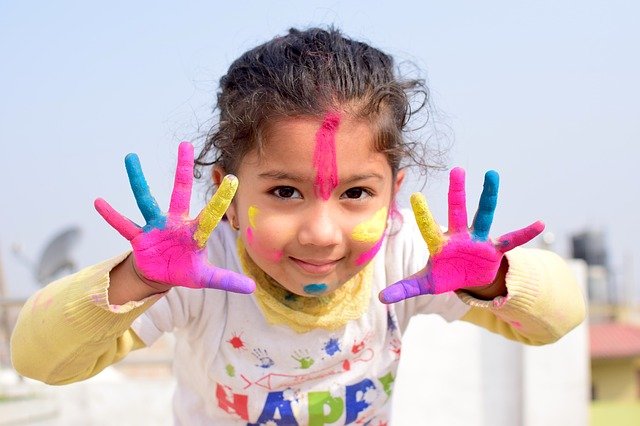We all want to know that we are doing a good job and that our efforts are being recognized. That is no different for our children. Praise can boost their confidence, encourage motivation and offer positive reinforcement. Praising a child with autism and ADHD is especially important since many times they are struggling with behavior issues and feel down about themselves.
Focus on effort, not intelligence or things out of your child’s control

To be most effective in your praise, it’s key to praise effort and not intelligence or anything that is out of your child’s control. While they may not be naturally talented at something, they can learn how to do it and get better at it through concerted effort.
Dr. Carol Dweck studied children and their views of success and failure. She defined them as having either a fixed mindset or growth mindset. A fixed mindset is when someone believes the talent or ability that they were born with is what they will always have. A growth mindset is when someone believes their abilities can grow and get better with effort.
Children who have a growth mindset will seek more challenging assignments to learn more and have higher achievements. I read Dweck’s book “Mindset” (affiliate link) a few years ago, and I realized my son J had a fixed mindset. I purchased her at-home online program called “Brainology,” and it helped him have a better understanding of how his brain can change and that he can grow. I’ve seen a difference in his schoolwork since then, and his willingness to work on something to get better at it. (Note that this is not an affiliate link – I just really liked the program and wanted to share the link with parents who may be interested in it for their kids!)
So praising your child for their efforts is one of the best ways you can motivate them and help increase their self-esteem and confidence!
Reasons to praise your child

Want more reasons to praise your child? Here are 14 of them:
1. It keeps them motivated
Let’s face it, we need motivation when we are working toward a challenging goal or learning to do something that is hard for us. That is the same for our kids. If they are working toward a behavior change, trying to master a new skill or working toward better grades in a difficult class, they need praise for putting in the hard work.
2. Gaining approval from adults, especially parents, is important to children
Our kids need approval from us to know they are on the right track. This is for things like behaviors, following rules, social skills, etc. This can be a fine line though. You want to keep this in perspective. You shouldn’t expect your child to need your approval for everything. They need their independence to pursue their own interests, set their own goals and more. That is when you can show support for what they are interested in learning and pursuing. Encourage them to follow their interests and their own dreams.
3. It improves their self-esteem
Praise can help lift their self-esteem. Our kids and teens with autism and ADHD can feel a bit defeated when they are faced with so many challenges in their lives. Encourage them to keep going and let them know their efforts are noticed and appreciated.
4. Increases their sense of self
Sense of self means your personal identity. That includes your characteristics, likes and dislikes, beliefs, moral code and more. Children and teenagers are trying to understand themselves better as they grow. Praise can help them on their journey of getting to know themselves.
5. Boosts their self confidence
Telling your child that they’ve done something well can give them confidence. Look for ways to let them know you recognize their hard work!
6. Rewards good effort
When your child has put a lot of effort into something, being praised rewards that endeavor. Keep it up!

7. Encourages good behavior choices
Praise can help them evaluate behaviors and make the better choice. If they know that certain choices will result in praise while others will not, they are more likely to choose the ones that lead to approval.
8. Increases their self-worth
Self-worth is related to self esteem and confidence. It is how someone values themselves as a human being. Self-worth includes how someone feels about their abilities and how much respect and pride they have for themselves. Do they trust their own judgement? Praise helps with self-worth because it encourages kids to learn to do more for themselves and be proud of their accomplishments.
9. Underscores who they are (e.g., I love you, kind person)
Praise doesn’t have to always relate to action. Sometimes, it’s good for you to tell your child that you love them for who they are and underscore that they are loved for being themselves. They don’t have to change to be appreciated or valued.
10. Offers positive reinforcement
If your child’s efforts are leading them the right way, praise can keep them going. It offers a positive reinforcement for good behaviors, right choices and more.
11. Inspires cooperation
Praise can help inspire your child to keep working on an important skill or task. If they are being praised for their efforts, they are more likely to cooperate to keep on task or doing the next steps to progress on learning a new skill or difficult subject.
12. Emboldens your child to try new activities and develop skills
Sometimes, it’s hard for our kids to try something new and be willing to work on a new skill. You can remind them of when they did it before and applaud them for previous efforts. This can help encourage them to try something new.
13. Incites persistence
When something is hard to do, praise can urge your child to keep at it. Persistence can lead to achievement. That then leads to self-confidence and higher self-esteem.
14. Encourages a growth mindset
As I noted above, praising effort can help your child focus on the process and progress in developing a new skill, learning a new subject or doing another task. Developing a growth mindset will help your child achieve many things in their life!

How to best praise your child
Want to know how best to praise your child for their efforts or job well done? Try these:
- Be specific in your praise
- Keep age and skill ability in mind
- Look for effort and good behavior to praise
- Remember that praise doesn’t always have to be in the form or words; it can be a smile, thumbs up or even a high five
- Focus on your child’s strengths
- Celebrate big and small victories, and focus on the progress your child is making
- Provide a reward or special privilege when it’s appropriate
- Discuss how their actions help others
- Try to praise at least three times more than you criticize
- Make the level of praise appropriate to the effort or behavior being praised – don’t exaggerate
- Praise effort and things your child can control instead of natural abilities to encourage growth.
How to avoid negative consequences of praise
Research has shown that praising children the wrong way can have negative effects. Keep these in mind to avoid those:
- Let your child know you support them even when they are angry, sad or overwhelmed
- Avoid insincere or inflated praise
- Don’t encourage perfectionism
- Be aware of praising efforts that come easily to your child
- Avoid comparison – focus not on comparing them to others but instead to themselves when learning to master a task or skill
- Don’t overpraise efforts for something your child enjoys – some is okay to encourage growth but focus on the effort to move forward
- Don’t go over the top in praise – that can backfire.
Why do you think praising your child is so important? What motivates your child and keeps them going? Leave a comment so we can support and encourage one another!








